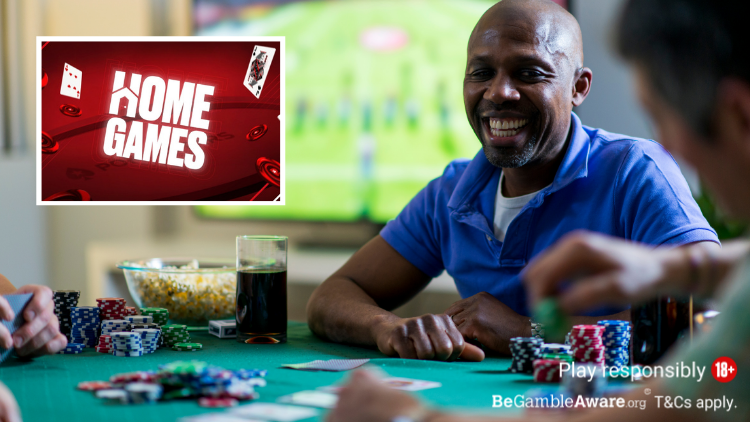If you’ve been invited to play poker with friends but you have no clue about poker strategy other than the fact that pocket aces are the best starting hand in no limit hold’em, then you’ve come to the right place.
One of the main reasons that poker players enjoy playing live poker is the social element. At poker events like the European Poker Tour (EPT), players get to sit and talk with others from all walks of life, each sharing the same passion for poker.
But poker can be just as great when it’s just you and your friends sitting around a dining table with a set of chips, a deck of cards, and some good banter.
Nobody wants to lose, of course, so if you want to be competitive it’s beneficial you set aside a little time before the game to formulate a plan. The best poker players in the world are those who work and study the hardest before they play. In your home games, however, it probably wouldn’t take much preparation for you to become the best player in the game.
Here, we’re going to outline some poker tips for beginners that will leave your friends wondering how you got so good so quickly.
(And if you’re wondering how to play online poker with friends, we’ve got you covered: find out how you can set up your own private poker home games on PokerStars right here.)
Be like Phil Hellmuth
No, we don’t mean you should parade around the room moaning every time you lose a pot. You’re probably going to lose friends doing that.


15x WSOP winner Phil Hellmuth, a.k.a. the Poker Brat
When we say be like Phil Hellmuth, we’re referring back to his 2003 book Play Poker Like the Pros, in which Hellmuth categorizes his poker opponents into different animal personas:
Mouse: a timid player who only plays the best starting hands and almost never raises
Lion: a tight player who is skilled and tough to beat
Jackal: a loose and wild player
Elephant: a loose calling station
Eagle: a really good player
This is a great place for beginners to start, especially when you know the people playing in the game very well (and you know most of them are not experienced players).
Think about your friends who will be playing in the game. Is John a wildman on nights out? Chances are he’s going to be a Jackal on the poker table. Does Sarah play at your local casino every week? Then she’s probably going to be an Eagle (i.e. the best player in the game). Does Harry always seem to vanish every time it’s his turn to buy the drinks at the bar? Then he’s probably tight with money and likely to be a Mouse at the poker table.
Once you’ve assigned each of your friends a persona, you need to know the best way to play against them.
Against a Mouse: As this player is timid and only waiting for very strong hands, you can play very aggressively against them (i.e. raise into them with mediocre hands) and take down a lot of pots. When they play back at you, you can be pretty certain they have the goods.
Against a Lion: This player knows the game and opts for a tight-aggressive style (they don’t play too many hands, but when they do they play them aggressively). It’s probably best to only play strong starting hands or starting hands that can flop very well (i.e. suited connectors like 8♥ 9♥ that can make straights and flushes) against them.
Against a Jackal: This player is wild and will be raising a lot, but they won’t always have a strong hand. They’ll put you in some tough spots, but you can amp up your aggression to turn the tables, or just let them go nuts when you have strong hands.
Against an Elephant: This player plays a lot of hands and hates folding. This means that when you have strong hands you can take them to value town (i.e. keep betting when you have strong hands knowing they’re going to call with a weak hand). It’s probably best to avoid trying to bluff them, though.
Against an Eagle: If you’re a beginner, try and avoid playing pots against the best player at the table where you can. Instead, focus your attention on the others. If you do go up against an Eagle, though, remember they will be capable of pulling off big bluffs and making their strong hands seem like bluffs, so tread lightly.
While Play Poker Like the Pros is pretty outdated these days, players at all levels of poker still make notes on each other and try to understand how their opponents are playing. It’s obviously not an exact science (you might find that you change a friend’s persona during the game based on how they play), but doing this will at least give you an idea of how you’re going to play against everyone.
Watch some Twitch streamers


The streaming greats: Lex Veldhuis, Ben Spragg and Fintan Hand
Watching poker streamers on Twitch is a great way to get better at poker, for both beginners and more experienced players alike. Plus, it’s pretty darn entertaining.
The likes of Lex Veldhuis, Parker “tonkaaaa” Talbot, Benj “Spraggy” Spragg, and Fintan “easywithaces” Hand stream high stakes poker tournaments on their channels, allowing you to watch along as they battle against the best in the game for huge sums of money, all while explaining their actions.
Even if it doesn’t feel like you’re studying the game, when you see how great players navigate hands and fields, certain strategies will seep into your brain through osmosis. You’ll no doubt have hands and situations similar to those you’ve watched, so you’ll have a better idea of what to do, and why.
Learn at PokerStars School
To get more into why you should do something in poker, you might want to check out some free training material before you play.
PokerStars School is an online training site where you can learn the basics of poker and start playing for fun. It has everything you need to improve your game and perfect your skills at a pace that suits you, and best of all it’s completely free to use!
Whether you want to find your playing style or learn how to steal the blinds, get better at 3-bet pots or figure out how to play small pocket pairs, PokerStars School has you covered.
Understand the table positions (and how to play them)
Position is important in all poker games, though especially in games that feature no-limit or pot-limit betting. In those games, individual bets can get quite big, which means players in later positions can put serious pressure on those in early positions.
In no limit hold’em–which is the most popular poker variant and most likely the one you’ll play at home games–the seats around the table all have particular names that refer to their position.


New players should become familiar with these poker seat names early in their poker education, Indeed, learning seat names should be among the very first poker definitions new players learn. Along with learning those seat names, players need to understand some of the common strategies associated with each position around the table.
Check out ‘Poker positions: seats, names and their strategies’ to learn more.
Try some play money games
If you want to get comfortable playing a poker game without risking any money, you can always play some play money games online on PokerStars against other beginners around the world.
Check out the ’PokerStars School Beginners Guide to Poker’ before you play, and if you ever do decide to play some real money games, make sure you’re playing at the right level for your skill level and bankroll. For more info on that, take a look at our article: ‘What poker stakes should I play?’.
Back to Top







